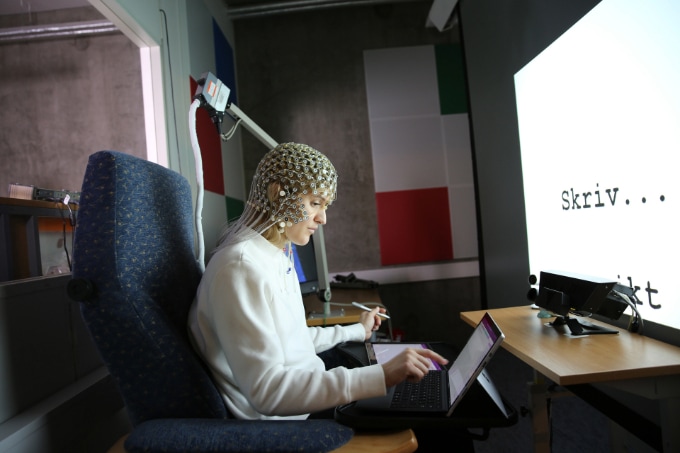Handwriting may boost brain connections that aid memory
Students who wrote words showed more links between brain regions than when they typed them
By
Using a pen or pencil to write boosts brain connectivity. That may explain why handwriting seems to aid learning.
RAFA FERNANDEZ TORRES/MOMENT/GETTY IMAGES |
Writing things out by hand might seem boring and slow. But handwriting can boost links across brain regions. That includes some with roles in learning and memory. The new finding adds to growing evidence of handwriting’s benefits.
Scientists snooped on the brain activity of college students who wrote by hand or typed words. Compared with when they typed, more of the students’ brain regions worked together when students scribbled with a pen. This trend also showed up in brainwaves — patterns of electrical activity — that have been linked with forming memories. That might mean writing notes by hand could boost memory of the material for a test, for instance.
Previous research had shown that handwriting improves spelling and the ability to remember what you’ve learned. Handwriting also strengthens the understanding of concepts. Scientists think that the slow process of tracing out letters and words gives people more time to process material and learn it.
This new study hints at why handwriting seems so good for memory. “There is a fundamental difference in brain organization for handwriting, as opposed to typing,” says Ramesh Balasubramaniam. A neuroscientist, he works at the University of California, Merced. He did not take part in the new work.
Brainwave boosts
Audrey van der Meer and Ruud van der Weel are psychologists. They study the human mind at the Norwegian University of Science and Technology in Trondheim. The pair recruited college students for their new study. They showed students a word on a computer screen, then asked them to type or handwrite it in cursive with a digital pen. All the while, sensors in caps they wore recorded electrical activity in their brains.
Brainwaves look like wiggles of electrical activity. The scientists examined the waves’ frequency, which is how many times the waves pulsed per second. The team was looking for different brain regions whose waves were in sync. When those waves have the same frequency at the same time, it hints at how strongly the areas are linked while working on some task.
With handwriting, the researchers expected to see an increase of brain activity in areas linked to movement. But they also saw a boost in certain waves related to learning and memory. And when students wrote by hand, intriguing connections emerged.

Handwriting — but not typing — increased the link between the brain’s outer parts (which play roles in moving and sensing) and central parts. Some of those central brain areas play a role in memory. The findings suggest these brain areas join forces during handwriting in a way that they don’t during typing.
The scientists shared their results January 26 in Frontiers in Psychology.
Even when the movements are very similar, the brain’s activity seems “much, much higher” in handwriting, Balasubramaniam says. “It shows that there’s more involvement of these brain regions when you’re handwriting.” That could aid learning. That’s because certain brainwaves that get a boost play a role in making and storing memories.
To write or type?
The team did not test whether the students remembered the words they wrote or typed. So it’s not yet clear how the increased brain activity affects learning, says Kathleen Arnold. A psychologist, she works at Radford University in Virginia. More study is needed on the differences in brain linkages and whether they align with how well people learn.
Differences in brain activity could be due to the unique movements required to type or write, Balasubramaniam notes. “But that said, we’ve got to start somewhere,” he says. “These are the first results to actually show that these two things have different brain-activation patterns.”
Handwriting may aid learning. But typing is often easier, faster and more practical. So students and teachers alike should decide, based on the task, whether to write it out or type, van der Meer says. For example, using handwriting to take notes might help you hang on to information, while typing an essay could help you get ideas down to the page faster, before you forget them.
